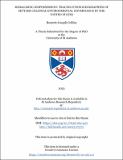Files in this item
Moralising dispossession : tracing ethnogeographies of settler colonial environmental governance in the United States
Item metadata
| dc.contributor.advisor | Sanghera, Gurchathen | |
| dc.contributor.advisor | Gani, J. K. | |
| dc.contributor.author | Collins, Bennett Joseph | |
| dc.coverage.spatial | 227 | en_US |
| dc.date.accessioned | 2023-05-11T13:11:53Z | |
| dc.date.available | 2023-05-11T13:11:53Z | |
| dc.date.issued | 2023-06-13 | |
| dc.identifier.uri | https://hdl.handle.net/10023/27573 | |
| dc.description.abstract | In this age of climate crisis, ‘the environment’, and its governance, has become a more active juncture of critical critique and discussion. This thesis specifically understands environmental governance in the United States as a reflection of a Liberal settler colonial governance rationality, and its historical precedent of dispossessing and displacing Indigenous peoples to primitively accumulate their lands for its populace and structures. As this thesis will explain, the history of environmental governance in the United States has tended to revolve around responding to its own contrived crises with solutions that help create settler ethnogeographies. The creation of such geographies not only help erase Indigenous ontological relationships, they also result in the materialisation of a settler nativism. Using critical discourse analysis, this thesis will specifically look to deconstruct three projects of settler colonial environmental governance that have resulted in the creation of settler ethnogeographies: the creation of the national park model; the impetus of the large dam; and the innovation of green technology. This thesis will argue that these projects, which have come to help define the global environmental governance apparatus, are reflective of a white possessive settler colonial desire to tame Indigenous lands for settler futures. | en_US |
| dc.language.iso | en | en_US |
| dc.rights | Creative Commons Attribution-NonCommercial-NoDerivatives 4.0 International | * |
| dc.rights.uri | http://creativecommons.org/licenses/by-nc-nd/4.0/ | * |
| dc.subject | Settler colonialism | en_US |
| dc.subject | Indigenous | en_US |
| dc.subject | United States | en_US |
| dc.subject | Environmentalism | en_US |
| dc.subject | National Parks | en_US |
| dc.subject | Dams | en_US |
| dc.subject | Reservoirs | en_US |
| dc.subject | Megadams | en_US |
| dc.subject | Postcolonialism | en_US |
| dc.subject | White supremacy | en_US |
| dc.subject | Ethnogeography | en_US |
| dc.subject | Anthropocene | en_US |
| dc.subject | Climate change | en_US |
| dc.subject | Green technology | en_US |
| dc.subject | Colonisation | en_US |
| dc.title | Moralising dispossession : tracing ethnogeographies of settler colonial environmental governance in the United States | en_US |
| dc.type | Thesis | en_US |
| dc.type.qualificationlevel | Doctoral | en_US |
| dc.type.qualificationname | PhD Doctor of Philosophy | en_US |
| dc.publisher.institution | The University of St Andrews | en_US |
| dc.identifier.doi | https://doi.org/10.17630/sta/443 |
The following licence files are associated with this item:
This item appears in the following Collection(s)
Except where otherwise noted within the work, this item's licence for re-use is described as Creative Commons Attribution-NonCommercial-NoDerivatives 4.0 International
Items in the St Andrews Research Repository are protected by copyright, with all rights reserved, unless otherwise indicated.


